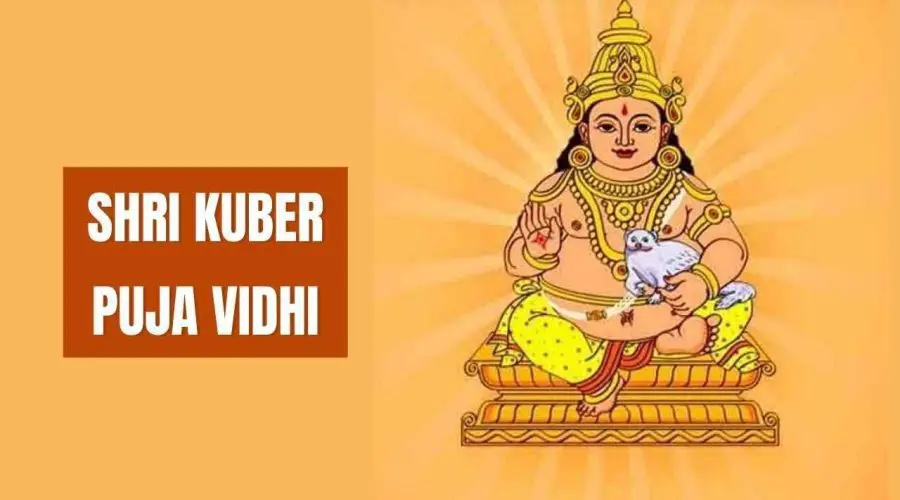Lord Kuber Puja Vidhi: Invoke Shri Kuber with the following mantras
Sri Lakshmi, the Goddess of Wealth, is worshipped alongside Lord Kuber, who is regarded as the world’s treasurer. Shri Kuber is traditionally worshipped on Amavasya day during Lakshmi Puja. During the five-day Diwali festival, Shri Kuber is also honored on Dhan Trayodashi.
If you have a Shri Kuber Murti or statue, you can use it for Puja. If you don’t have a Kuber Murti, you can worship a chest (Tijori) or a box of jewelry that represents Shri Kuber. Draw the Swastik symbol with Sindur and tie Moli (Kalaya) on it before you begin worshipping the chest.
- Dhyana (ध्यान)
First and foremost, one should concentrate and recall Shri Kuber using the Mantra below.
मनुज-ब्रह्मा-विमना-स्थितम्,
गरुड़-रत्न-निभम निधि-नेकम।
शिव-सखं मुकुटदि-विभुशीतम,
वर-गड़े दत्तम भजे तुंडीलम।
Meaning – I pray magnanimous Shri Kuber, Who mounts on a human-form chariot, Who is a master of all Nidhis (treasures) like great Garuda, Who is a friend of Lord Shiva, Who is adorned with a crown and other Jewelries and Who has one hand in Var-Mudra and carry Gada in the other hand.
- Avahana (आवाहन)
Invoke Shri Kuber using the following Mantra after completing Shri Kuber’s Dhyanam. Your hands should be in the Aavahan Mudra in front of your chest while summoning Shri Kuber (Aavahan Mudra is formed by joining both palms and folding both thumbs inwards).
आवाहयमी देव! त्वमिहयाहि कृपाम कुरु।
कोशम वर्धया नित्यम, त्वम परी-रक्षा सुरेश्वर।
श्री कुबेर-देवम आवाहयमी
Meaning – O Dev, Devo Ke Dev–Sureshwar! I’m inviting you. Please come and dwell here to oblige me. Please protect and enrich my treasure and its riches. Hence I invoke Shri Kuber.
You may also like to read – Ram Navami Puja Vidhi
- Pushpanjali Asana (पुष्पाञ्जलि-आसन)
When Shri Kuber reaches the chest, take five flowers in Anjali (by uniting the palms of both hands) and place them in front of the chest to offer Shri Kuber the seat while repeating the Mantra.
नाना-रत्न-संयुक्तम कार्त्य-स्वर-विभुशीतम।
आसनम देव-देवेश! प्रीत्यार्थम प्रति-गृह्यताम्।श्री कुबेर-देवय आसनार्थे पंच-पुष्पाणि समरपयामी
Meaning – It means–O Lord of Dev! Please accept the golden seat decorated with different types of jewels for my pleasure. Hence, I offer five flowers for the seat of Shri Kuber.
- Nav Upchara Pujan (नव उपचार पूजन)
Then, while reciting the Mantras, perform Shri Kuber Puja with Chandan, Akshata, Pushpa, Doop, Deep, and Naivedhya.
ओम श्री कुबेरय नमः पद्यं पध्याय समरपयामी।
ओम श्री कुबेरय नमः शिरसी अर्घ्यं समरपयामी।
ओम श्री कुबेरय नमः गंधक्षतां समरपयामी।
ओम श्री कुबेरय नमः पुष्पम समरपयामी।
ओम श्री कुबेरय नमः धूपम् घ्रापयामी।
ओम श्री कुबेरय नमः दीपं दर्शन्यामी।
ओम श्री कुबेरय नमः नैवेद्यं समरपयामी।
ओम श्री कुबेरय नमः अचमनियम समरपयामी।
ओम श्री कुबेरय नमः तंबूलं समरपयामी।
- Puja Samarpan (पूजन समर्पण)
Take Gandha, Akshata, and Pushpa in your left hand and place them over or near the chest with your right hand while chanting the Mantra as described above.
श्री कुबेरई नमः।
आइए श्री धनाध्याक्ष-श्री कुबेर प्रियात्मा की पूजा करें।
नमो नाम।
Meaning – I convey my regards to Shri Kuber! I hope Shri Kuber would be pleased with my worship. I salute Him again and again.
यह श्री कुबेर पूजा समाप्त करता है।
You may also like to read – Ganesha Puja Vidhi
Frequently Asked Questions
1. Can we worship Kuber idol at home?
Kuber’s idol should be facing south. Do not bring antique temple idols into your home. Idols should not be positioned such that one’s face is facing another. Place God’s idol in the chapel facing east or north.
2. Which day is Kuber day?
The term Dhan means money, and Hindus worship Lord Kubera and Goddess Lakshmi, the God, and Goddess of Wealth, for good luck and prosperity on this auspicious day.
3. How do Kuber puja?
On the puja platform, place a photo/idol of Lord Kubera and Goddess Lakshmi, or draw the Swastik sign with Sindur on the breast (Tijori) or business book. Invoke the gods by joining your palms in prayer. While chanting the Lord Kubera Mantra, offer flowers, Chandan, Akshata, Doop, Deep, and Naivedhya.
4. Is Laughing Buddha and Kubera are same?
One of the most popular among them is the ‘smiling Buddha,’ who makes everyone energetic and cheerful. This Buddhist monk, who wears a potbelly and carries a bag, bears a striking similarity to Kubera, the Hindu God of Wealth. As a result, Indians regard the laughing Buddha as a divinity of prosperity.

